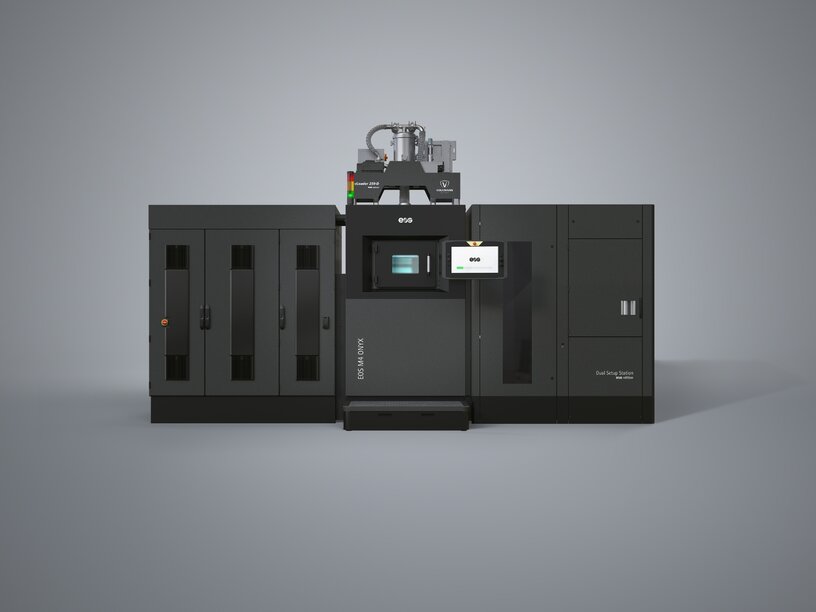Building a More Sustainable Metal AM Process
How the Next-Gen Recirculation Filter System (RFS Pro) Sets a New Standard
november 19, 2025 | Reading time: 5 min
At EOS, we exist to accelerate the world’s transition to responsible manufacturing – and sustainability in metal additive manufacturing (AM) is central to that mission. It’s a principle that must be designed into every step of the process. For years, filter systems in AM machines have delivered solid, reliable performance by capturing reactive byproducts and supporting safe operations. But today, manufacturers need even more. The industry faces growing expectations to reduce waste, cut greenhouse gas (GHG) emissions, and advance toward closed-loop, circular production models.
Our Next-Gen Recirculation Filter System – RFS Pro – is our answer to this challenge: a leap forward in making metal AM more efficient – and more sustainable. This innovation actively transforms it from pyrophoric waste into non-reactive waste. By recovering reusable powder, neutralizing reactive waste on-site without chemicals, and reducing manual handling, it helps manufacturers close the loop, cut disposal costs, and shrink their environmental footprint.
Saving that add up: Depending on the material and process parameters, manufacturers can save €5,000 or more per year in waste disposal costs alone – not including additional savings from reduced consumables and recovered powder.
Recovering Valuable Powder Instead of Disposing It
Traditional filter systems often send large quantities of powder waste to disposal, even though a significant share remains usable. The RFS Pro from EOS includes a precision cyclone that separates and recovers these reusable fractions with high efficiency. Instead of losing valuable material, manufacturers can reintegrate it into production – reducing both raw material demand and emissions from powder production. Depending on the material, the system achieves a powder recovery rate of 50% to over 95%. For a single running system, this can translate into savings of more than 30 tCO₂e per year – simply by reusing the material from the process instead of buying new powder.
Neutralizing Reactive Waste – No Additives Required
Unlike current systems that rely on additives for passivation, the integrated oxidation unit achieves this through a self-contained process – without the need for external passivation media. The result: no transport or storage of hazardous substances, simplified operator workflows, and no consumables to manage or dispose of.
To put this into perspective: producing just one liter of silicon oil emits over 8 kgCO₂e. Each container of waste typically requires more than 11 liters, equating to around 90 kgCO₂e per container. With our system, this is reduced to zero – a 100% reduction in silicon oil emissions. Annual savings depend on system utilization and material choices, but the environmental impact is significant.
Supporting Circular and ESG Goals
These innovations support customers’ broader sustainability strategies by reducing demand for virgin powder, lowering hazardous waste generation, and minimizing emissions tied to waste handling and raw material production.
They also help address regulatory drivers such as:
- CSRD*: In sustainability reports according to CSRD, hazardous waste must be reported – our system helps reduce it.
- CCF** Scope 3.1: Lower emissions due to reduced virgin material and consumables demand.
- CCF Scope 3.5: Lower emissions due to reduced waste generation.
Here, two relevant categories are:
- Scope 3.1: Emissions from purchased goods and services – reduced by using less virgin powder and fewer consumables.
- Scope 3.5: Emissions from waste disposal – reduced through less hazardous waste and chemical use.
Summary: A Smarter Way to Filter – for People, Planet, and Performance
RFS Pro is more than a technical upgrade – it’s a strategic enabler for sustainable, future-ready metal AM production. By recovering valuable powder, eliminating chemical additives, and reducing GHG emissions and significant waste amounts, it helps manufacturers meet rising environmental standards while improving operational efficiency. Whether you're aiming to report improvements along with the CSRD based sustainability report, reduce your corporate carbon footprint, or simply make smarter use of resources – this innovation brings measurable impact to your sustainability journey.


